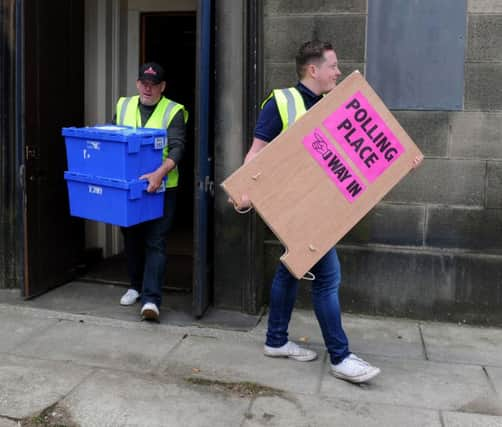Electronic voting systems could replace paper ballots in Scotland


Just like their Victorian ancestors, they are asked to mark an X on a ballot paper next to their chosen candidate. But all that could be about to change - in Scotland, at least.
The Scottish Government’s consultation on electoral reform closed this week and ministers will soon begin scrutinising responses from across the country.
Advertisement
Hide AdAdvertisement
Hide AdIt plans to trial “innovative” electronic voting which would mean votes could be cast on electronic machines within traditional polling stations - using systems “similar to ticket machines at railway stations or supermarket automated checkouts”.
More boldly, votes could also be cast remotely via home computers or mobile devices.
Launching the consultation in December last year, parliamentary business minister Joe Fitzpatrick said: “Our voting systems have remained broadly unchanged in over 100 years and now is a good time to think about modernising and innovation.”
Electronic voting machines within polling stations are already used in a variety of countries, including American states. But the concept of online voting on a laptop or smartphone remains untested on a large scale.
In 2005, Estonia became the first country to offer online voting to its entire electorate. Almost a quarter of all votes cast in the 2011 parliamentary elections were made online.
The Baltic nation is regularly cited as the most connected in the world - every citizen has an online ID card containing biometric information about them and digital signing capabilities. It also has the advantage of an electorate smaller in size than the population of Greater Glasgow.
Introducing a similar system in Scotland would present challenges as well as offering benefits. The need to print and transport over 4.5 million paper ballots could be substantially reduced, saving money and reducing both carbon emissions and waste.
But electoral reform is a sensitive subject. Public confidence in the system is vital. Previous efforts to try and streamline the process and increase turnout have not always worked.
Advertisement
Hide AdAdvertisement
Hide AdMinisters will not need reminding of the 2007 election, when a decision to hold both Holyrood and council votes on the same day resulted in a huge increase in spoiled ballots and general confusion over the separate systems employed.
There is also some opposition to the concept of electronic voting.
Craig Dalzell, head of research at the Common Weal think tank, described it as “inherently insecure”.
“There has been a temptation in recent years to try to “modernise” the voting system to cut costs and to make voting more appealing to younger citizens,” he said.
“One method often toyed with is electronic voting in some form or another.
“However, many forms of electronic voting have shown themselves to be vulnerable to fraud or hacking in ways that paper voting is currently inherently secure against. A networked electronic voting system may be completely compromised by hackers.
“There is potential for electronic assisted voting to make voting easier and to reduce accidentally spoiled or miscast ballots but this must be coupled with hardcopy verification to prevent electronic voting fraud.”
